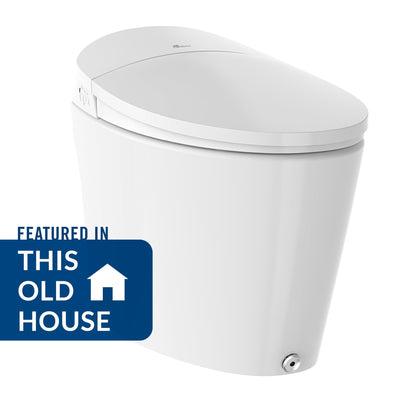How to Get Rid of Gas Fast – Bio Bidet by Bemis

Everyone experiences gas and bloating on occasion. After a big meal or due to underlying health issues, discomfort can turn into excruciating gas pain that can be temporarily debilitating. Find out how to get rid of gas quickly and what causes gas and bloating in the first place.
What Causes Gas and Bloating?
Some medical conditions or dietary sensitivities may make some individuals more prone to gas than others. Intestinal gas is usually produced in two ways:
- Air intake – We swallow a little air every time we eat, drink, chew gum, or exercise. This passive air intake doesn't typically impact our digestive system but swallowed air can sometimes find itself in the intestines.
- Food digestion – As food moves from the stomach to the small and large intestine, it's chemically digested by enzymes and bacteria. Healthy gut flora usually aids digestion, although it can sometimes produce gases such as methane.
Healthy Habits to Prevent Gas
Gas is a natural part of digestion and usually isn't a cause for concern. If it's a persistent issue, start by making a few changes to your eating habits and noting the foods that cause gas consistently.
- Slow down at meals – Chew your food slowly and completely between bites, and don't rush. Eating in a hurry can increase the volume of air swallowed during a meal.
- Use a straw – Instead of drinking straight from the glass, use a straw to reduce air intake.
- Skip the soda – Carbonated drinks, including soda and seltzer water, can increase the amount of gas in your digestive system. Stick to "flat" beverages like water and tea.
- Take a broccoli break – While healthy, some vegetables are harder to digest. Cruciferous vegetables like broccoli and cauliflower can cause gas. If you do consume these veggies, try steaming them until they're nice and soft!
- Watch what you eat – Other foods can famously cause gas, like beans and cabbage, typically due to high sugar or starch content. Monitor what you eat with a food diary and eliminate foods that may be the source of your distress.
- Give it time – Sudden dietary changes can affect gut health and even change how we digest foods. If you've just started a new diet, added in or removed certain foods, or started a new medication, your system may take a few weeks to adjust.
Go Ahead; Fart
Unless you're experiencing severe symptoms, a bit of gas is okay! The average person toots between 14 and 23 times a day. Instead of frequency, focus on whether gas and bloating are becoming uncomfortable enough to impact your life.
The Symptoms of Intestinal Gas
Our bodies typically expel excess gas in the digestive tract by belching or farting. It's quick, painless, and, sometimes, a little funny. In some cases, gas builds in the intestines, producing a full or bloated feeling. In more severe cases, gas can be extremely painful.
Mild symptoms of gas include:
- Belching
- Bloating
- Burping
- Flatulence
More severe cases of gas are more painful and debilitating and can produce:
- Abdominal pain
- Diarrhea
- Fever
- Nausea
- Vomiting
If you're experiencing these severe gas symptoms, contact your healthcare provider. You may even need emergency medical care to relieve gas pain quickly.
Related: How to Improve Gastrointestinal Health
How to Get Rid of Gas Pain Fast
If you've experienced severe gas pain, you know it's nothing to joke about. It can feel like a knot or cramp in your stomach, abdomen, back, or chest. Some patients experience trapped gas and rush to the hospital, convinced they're having a heart attack or appendicitis!
Try these quick ways to relieve gas at home:
- Drink water – If plain water doesn't sound appetizing, try herbal teas. Peppermint and ginger root may help calm a troubled stomach.
- Go for a walk – Light exercise can help move trapped gas through your intestines. Avoid strenuous exercise until symptoms resolve.
- Stretch it out – Some yoga poses, such as child's pose, can help massage and shift trapped gas and provide fast relief.
- Use a bidet – Bidets can help relieve gas symptoms by stimulating bowel movements that free trapped gas. Some models, like the BB-1000, include a specific setting designed to relieve constipation and gas.
If pain persists, try an over-the-counter medication to relieve gas symptoms. Look for OTC drugs that contain:
- Alpha-galactosidase
- Lactase
- Simethicone
Be sure to follow any instructions or health warnings and talk to your doctor if you're facing recurring gas pain.
Health Starts at Home with Bio Bidet by Bemis
The occasional two-cheek salute is a healthy, natural way to relieve trapped gas. Watch what you eat, slow down at meals, and make intelligent changes to your diet to reduce gas flare-ups and stay on the move. Bring your health and hygiene priority home and take our Bidet Quiz to find the right bidet for you!




